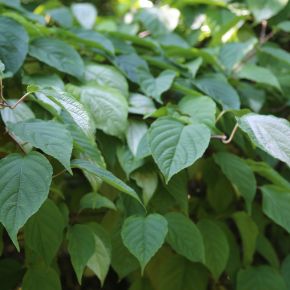Actinidia kolomikta
(Variegated Kiwi Vine)
Family - Actinidiaceae
Category - Climber
Origin - Eastern Asia
Year of Introduction - 1855
Season of Interest - Spring, Summer, Autumn
Hardiness - H5
Height - 3m to 6m
Location - The Woodland Walk
Description: A Deciduous and vigorous climber. Large ovate to oblong (sometimes heart-shaped) leaves are mid to dark green with finely toothed margins. Once the plant is established the leaves will develop showy white and vivid pink variegation towards the tips that can be quite substantial (sometimes covering the whole leaf). The variegation is often not present on young plants and can be less conspicuous in shady conditions. Male and female flowers are held on separate plants (Dioecious). Most of the plants of this species in cultivation are male. The Blooms are creamy white with red calyces. The flowers have an intense, sweet fragrance and are bowl-shaped. The flowers are fairly well hidden among the foliage and can often be smelled before they are seen. The Blooms are held in clusters and produced in early summer. If both male and female plants are present, the female flowers may be followed by round, edible sweet fruit with yellowish skin.
Award of Garden Merit (AGM).
Flower:
Dioecious, male and female flowers are produced on separate plants. Fragrant, creamy white flowers are bowl-shaped and have red calyces. Male flowers have a central cluster of yellow stamens. Species of this plant in cultivation tend to be male. The flowers are held in small clusters and are produced in June. If both male and female flowers are present, the female flowers may be followed by small, round edible fruit with yellowish skin and a sweet flavour.
Flower colour: White
Flower shape: Bowl-shaped flowers in clusters
Flowering time: June
Foliage:
Ovate to oblong (sometimes Cordate) leaves are mid to dark green and have serrate margins. Established plants will develop highly conspicuous, white and pink broad variegation towards the tips of the leaves. The variegation is often not present on young plants and is more pronounced in a full sun position. The leaves are Alternately arranged on the twining stems.
Foliage Senescence: Deciduous
Foliage Shape: Ovate to oblong, cordate
Propagation:
Cuttings, grafting, seed.
Cultivation:
Best in a sheltered position in full sun to partial shade in fertile, moisture retentive soil that is well drained.
